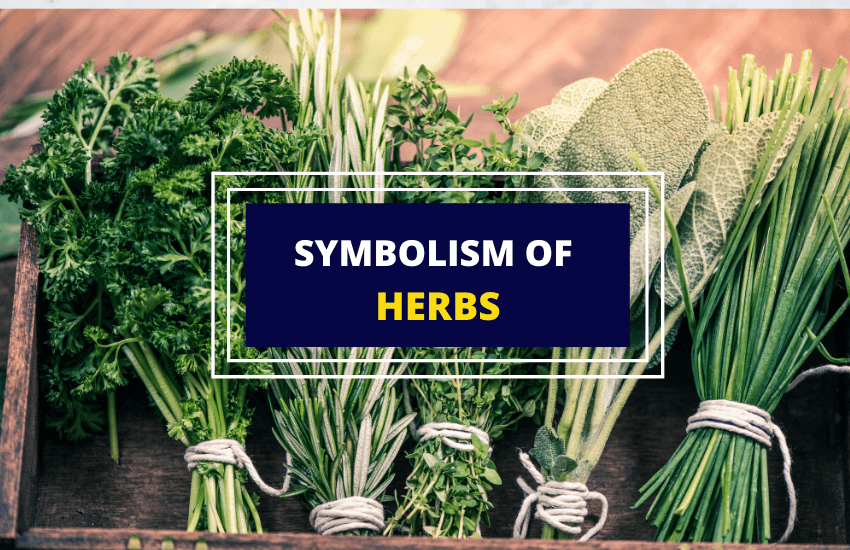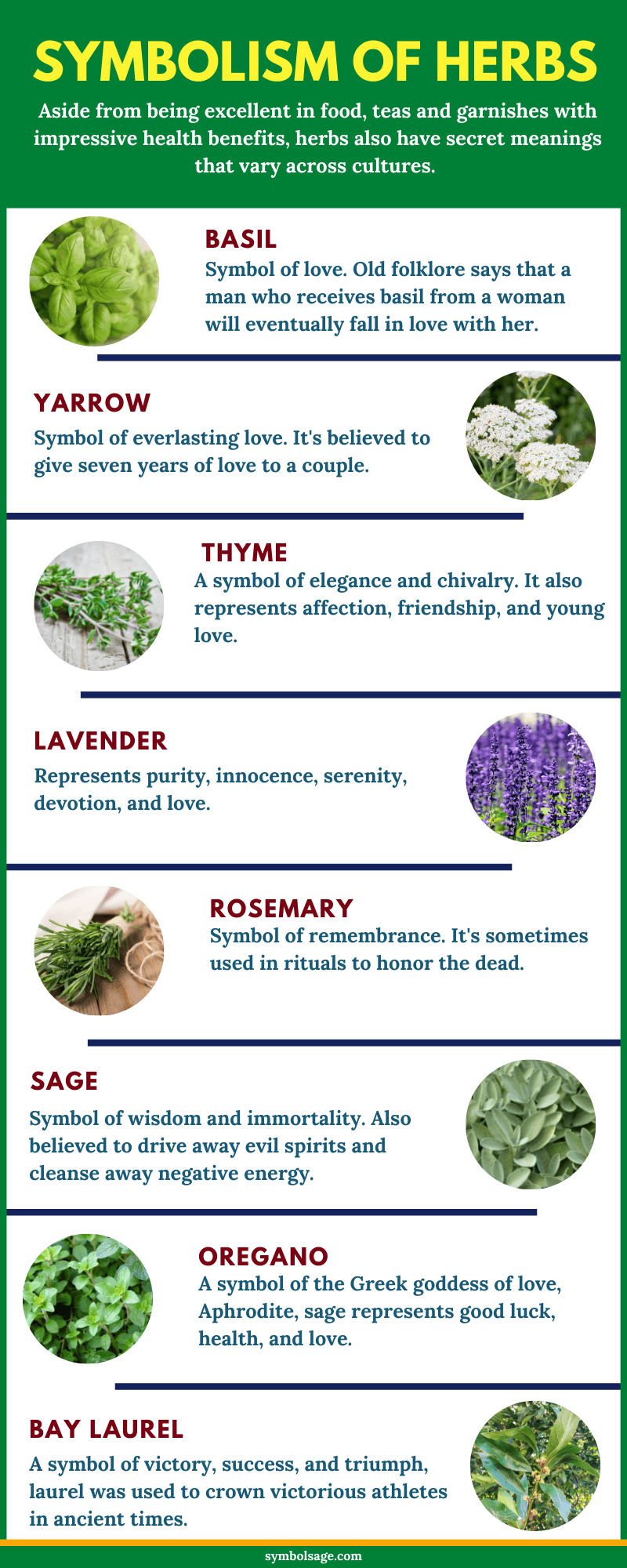
Table of Contents
Before the time of emojis and quotes, many people used plants to express how they felt for someone. Flowers were long used to send messages in the Middle East and Persia and became extremely popular during the Victorian era. People sent secret messages to one another using certain flowers that had meanings associated with them.
But did you know that herbs also had a language of their own? Aside from being excellent in food, teas and garnishes with impressive health benefits, herbs also have secret meanings that vary across cultures.
Here is a list of popular herbs and what they symbolize.

Basil
This herb is easy to grow and is available in different varieties. It is highly popular in Mediterranean cuisine. People love it for its spicy scent and refreshing, minty flavor.
The Greeks and Romans used to associate basil with hatred. The Greeks thought that basil only existed to drive men insane. However, this negative connotation of basil doesn’t exist today. Basil became a symbol of love in Italy and has retained that meaning ever since. Old folklore says that a man who receives basil from a woman will eventually fall in love with her.
Calendula
Calendula is a flowering plant used in a variety of ways for its healing benefits. It can also be made into an herbal tea.
In the past, Christians hung this herb around the statues of the Virgin Mary. In India, it is considered to be one of the most sacred flowers that symbolize serenity, gratefulness, and excellence. The Hindu god Ganesh and goddess Lakshmi were also related to the energies of calendula, making it a symbol of health, success, and wealth,
In Mexico, calendulas are planted near the front door of houses because they’re believed to attract wealth and good spirits. In Victorian flower language, it was included in bouquets to convey that one’s thoughts are with the recipient. In addition to this, they were included in flower arrangements for funerals because they communicated grief and express condolences.
Yarrow
Yarrow is considered to be one of the oldest medicinal plants known to humankind. The above ground parts of yarrow are used to make various medicines. The flower and leaves are also used in salads. In the medieval period, Europeans used yarrow to exorcise and summon demons. This eventually made people associate this herb with feelings of security and protection.
Today, yarrow is symbolizes everlasting love. It has been used in weddings because the plant is believed to foster true love for seven years after a couple gets married. This is also why some people call this herb seven year’s love.
Thyme
Thyme is an herb with a long and interesting history and has grown to symbolize many things. Its name was derived from the word thymus which means courage. The Greeks used this herb to represent elegance, and in the Middle Ages, it became a common symbol for chivalry.
Thyme also represents a feeling of affection, making it a perfect symbol of deep friendship or young love. If you want to express your love and devotion to someone, adding a sprig of thyme to a bouquet will be a discreet but thoughtful way to do it.
Lavender
Native to the Mediterranean region, lavender has been used in cooking and medicine since Biblical times. In terms of symbolism, this fragrant herb is used to symbolize devotion and undying love.
Lavender also symbolizes purity, making it popular in weddings and other ceremonies that celebrate someone’s purity and innocence. It also represents serenity, as its calming scent is ideal for relaxation and tranquility. It’s used in various oils and fragrances that promote relaxation.
Fennel
Fennel was first mentioned by Pliny, a Roman author who believed that snakes rub against fennel to improve their eyesight when they shed their skin. Roman gladiators were known to eat fennel seeds before battles to give them courage.
The herb also appears in William Shakespeare’s Hamlet as one of Ophelia’s flowers. In Shakespeare’s time, this herb was used to symbolize strength and courage.
Fennel may also symbolize flattery and is sometimes given as gifts to those who have done well because they represent something worthy of praise. Married couples and new lovers can give fennel to each other though because it is known as a symbol of strong, passionate love.
Rosemary
Rosemary is one of the msot popular herbs, known for its sharp scent and thin glossy leaves. The herb was a popular symbol of remembrance.
In funerals, mourners received rosemary sprigs and threw them into the coffin, while others put the stems of rosemary among the dead. Australians are also known to wear sprigs of rosemary to honor their dead during Anzac Day.
Even in Shakespeare’s Romeo and Juliet, a rosemary sprig was placed on Juliet’s tomb to signify remembrance.
Sage
The excellent medicinal properties of sage make it a popular symbol of immortality, and some people believe that eating sage can make you immortal. It is also considered a symbol of wisdom because it is known to improve one’s memory.
Ancient cultures also believed that garden sage can protect people’s spiritual sanctity. They used it to drive away evil spirits and cleanse the negative energy from different places.
Oregano
While oregano is almost always associated with cooking, the Greeks believed that it was an herb that represented Aphrodite, the goddess of love. It is said that she created oregano as one of the herbs in her garden.
In Elizabethan times, oregano was also used to bring good luck and wish someone good health. Some even used it in magic spells to improve their health and bring happiness to their lives.
Patchouli
People usually associate patchouli with love and intimacy because of its lusty and heady scent. It is popular in aromatherapy as a scent that both relaxes and stimulates depending on the mood that you are trying to set. It has long been used as a remedy for skin ailments like acne, dry skin, and dermatitis.
Bay Laurel
Bay laurel is a shrub known for its white flowers and dark green foliage. Most people don’t know that bay leaves and laurel leaves are the same thing, but they are. The plant has a long and rich history, especially in ancient Greek times where they were used to crown the heads of victorious athletes.
Laurel leaves brings a sense of calm to any garden, making it an ideal plant for creating hedges or attractive shapes on pots and containers.
Bay leaves are known to symbolize triumph and victory. In ancient times, heroes and prominent people were usually given a wreath that was made of laurel leaves. Prestigious titles like poet laureate and baccalaureate are also derived from bay laurel and the plant’s symbolism of success.
Wrapping Up
Saying something with flowers is truly intriguing but expressing your feelings through herbs can be just as exciting and somewhat unique. Whether you’re thinking of gifting someone a pot of herbs or adding some herbs to your garden, understanding what they mean is a great first step.








